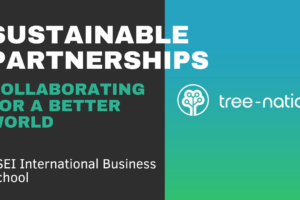
The Role of Governments and Companies in Promoting Sustainability
- Categories ESEI Core Values, Barcelona, ESEI Community

As awareness and understanding of climate change grow, an increasing number of governments and companies are taking action to promote sustainability. The implications for our planet’s future depend on the willingness of all stakeholders—from local cities to multinational corporations—to make sustainable choices. This blog post will explore how governments and businesses can encourage sustainability practices, giving readers a better idea of what they can do to ensure a healthier environment for generations to come.
How Governments Have Begun Promoting Sustainability

Government involvement has been widely recognized for its potential to play an immense role in jumpstarting progress toward protecting public health and the environment. The question remains—how can governments best promote the cause of sustainability? We’ll dive into the core strategies and solutions that governments can use to drive forward meaningful change when it comes to environmental stewardship.
Voluntary Codes
Governments around the world are using Voluntary Codes to promote sustainability in various industries. These codes are established rules and guidelines that businesses agree to follow, with compliance voluntary for those who abide by them. What differentiates these codes from imposed regulations and legislation is the high degree of engagement by stakeholders. This participation encourages proactive behaviors such as reducing emissions, reducing waste, and improving efficiency while saving costs and resources.
Mandatory Codes
Governments can create and mandate sustainability codes for their citizens and businesses in order to ensure that compliance with eco-friendly and sustainability practices is maintained. Such codes help create norms to encourage the adoption of public policies promoting sustainable development, such as renewable energy use, resource use efficiency, circular economy principles, and more. These regulations provide an avenue for businesses to remain financially viable in the longer term by shifting focus away from short-term goals and towards a greener future.
Exporting Domestic Environment Standards
Governments have an opportunity to make a lasting impression on their citizens and the world by setting high environmental standards. Creating legally binding agreements within countries that require their citizens to abide by a certain level of eco-friendliness can make a huge impact on sustainability. But, what if those standards could be exported abroad? If a nation could share its domestic environmental requirements and push other countries to adopt them, there would be a global market for green products and services that followed ethical practices. Allowing governments to take part in sustainability initiatives while stimulating economic growth creates a healthier planet for everyone. Get in on the green wave today!
Collaboration with Researchers
The shift to a more sustainable future is no small feat: It’s a mission best suited to an expansive, multi-pronged effort. Governments are in a unique position to galvanize this noble endeavor into action by collaborating with some of the world’s leading researchers and utilizing educational campaigns to promote sustainability. By working hand-in-hand with those in the private and public sectors, governments can expedite the introduction of cost-effective solutions such as mainstream adoption of renewable energy resources and establishing local conservation efforts – thereby setting us on a path towards a healthier environment for generations to come!
Partnerships to Tackle Environmental Challenges
By working together, governments across the world can promote sustainability and tackle environmental challenges with innovative partnerships. Investing in healthier and more resilient communities yields long-term rewards; these collaborations boost job creation, improve public health, and provide a pathway to reducing our environmental footprint. With collaboration at the forefront of viability, governments are presented with the unique opportunity to make positive changes on a large scale. Developing and utilizing these partnerships could significantly enhance global efforts toward solving the environmental threats we collectively face. By taking action now, leaders have the chance to engage citizens in smarter decision-making processes that ensure a livable planet for future generations. Together, let’s unlock potential solutions through transparent and communicative collaborations!
How Companies are Promoting Sustainability

As companies look for new opportunities for innovation that enable more growth and convenience for consumers as well as positive long-term sustainable results at large—we may find an increased role of business in promoting sustainability is needed. Let’s explore the possibilities of global corporate engagement in facilitating changes towards environmental protection while simultaneously protecting human rights; discuss what actions already being taken look like today; and raise questions regarding how far should such business endeavors go into making these major advances happen.
Creating a Corporate Sustainability Plan
Businesses taking the initiative to establish sustainable practices can help position themselves as industry leaders. Through investing in projects like natural resource protection, energy efficiency upgrades, and waste management improvements, companies can demonstrate their commitment to reducing the environmental footprint incurred by their business operations. By creating a corporate sustainability plan that outlines clear objectives, progress milestones, and results measurements, businesses will find that they not only benefit their local environment but also reap substantial economic rewards. Take the next step towards sustainability by crafting your own corporate sustainability plan today!
Developing Sustainable Products, Services, and Processes
Companies can seize the opportunity to create a more sustainable future by developing sustainable products, services, and processes. Although initial investments may seem intimidating, companies can benefit from enhanced customer engagement, increased customer loyalty, and unique market positioning opportunities that come with investing in sustainability. Companies promoting sustainability seek new ways of protecting resources, adopting environmentally friendly practices, and striving for wider social benefits while decreasing carbon footprints in an effort to reduce environmental impact. Companies willing to make the effort in developing sustainable products, services, and processes are not only enhancing the quality of life but also increasingly presenting themselves as an ethical brand that stands out from their competition.
Reducing the Amount of Waste in Manufacturing Processes
Companies now have the opportunity to take advantage of this new era of sustainability by implementing strategies to reduce the number of wasted materials used in their manufacturing processes. Whether through improved efficiency or making use of recycled and upcycled elements, companies can save money, reduce their environmental footprint and demonstrate a commitment to responsible practices that benefit both customers and the future of our planet. Companies that prioritize sustainability now will reap the rewards of building trust, creating a loyal customer base, and setting themselves up for a successful future.
Giving Back To The Community
Companies advocating for sustainability can make a positive impact by giving back to their communities and investing in local programs. By participating in activities such as organizing beach clean-ups and contributing supplies to food pantries, companies have the opportunity to demonstrate their serious commitment to environmental responsibility while demonstrating corporate citizenship. Investing in local causes also allows companies to show appreciation and build relationships with customers and employees in the community. Companies that prioritize sustainability initiatives are demonstrating that corporations have an obligation to ensure a healthy environment for future generations and shape a greener tomorrow.
Organizational Governance for Sustainability
Companies that are serious about achieving sustainability don’t just think about it — they make sure it is a core guiding principle in their day-to-day activities. Companies that are making a real commitment to promoting sustainability can use Ensuring Organizational Governance for Sustainability (EOGS) as the foundation of their practices. By multiplying the collective impact of many key areas, such as procurement and production, EOGS provides a blueprint for companies to maximize their environmental and economic efforts while minimizing any negative impact on community stakeholders and other parts of the environment. Companies can gain confidence in their sustainability journey with EOGS, knowing they are doing everything they can to ensure positive outcomes now and well into the future.
The responsibility for a sustainable future lies in the hands of governments and private companies. Both have tremendous power to shape our society’s structure and relationship with the environment, presenting both opportunities and challenges on how we move forward. With an increased focus on creating robust sustainability measures, governments and corporations can pave the path for a greener future for us all.
Small choices like conserving energy and refusing single-use items can lead to positive changes in our lifestyles while making a visible difference to the environment. We must all work together — governments, companies, and individuals — in order to make real progress toward sustainability. ESEI is working on this goal right now – join us in making the world a better place!
Interested in Museums around Barcelona?
Previous post



